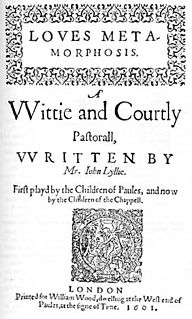
The Merry Devil of Edmonton is an Elizabethan-era stage play; a comedy about a magician, Peter Fabell, nicknamed the Merry Devil. It was at one point attributed to William Shakespeare, but is now considered part of the Shakespeare Apocrypha.

Satiromastix, or The Untrussing of the Humorous Poet is a late Elizabethan stage play by Thomas Dekker, one of the plays involved in the Poetomachia or War of the Theatres.

The Maid's Metamorphosis is a late Elizabethan stage play, a pastoral first published in 1600. The play, "a comedy of considerable merit," was published anonymously, and its authorship has been a long-standing point of dispute among scholars.

Foul papers are an author's working drafts. The term is most often used in the study of the plays of Shakespeare and other dramatists of English Renaissance drama. Once the composition of a play was finished, a transcript or "fair copy" of the foul papers was prepared, by the author or by a scribe.
Cupid's Revenge is a Jacobean tragedy written by Francis Beaumont and John Fletcher. It was a popular success that influenced subsequent works by other authors.
The Arcadia is James Shirley's dramatization of the prose romance, The Countess of Pembroke's Arcadia by Sir Philip Sidney — one expression of the enormous influence that Sidney's work exercised during the 17th century. Shirley's stage version was first published in 1640.
The Brothers is a Caroline era stage play, a comedy written by James Shirley. First published in 1653, The Brothers has sometimes been hailed as one of Shirley's best plays, though it has also been a focus of significant confusion and scholarly debate.
An Humorous Day's Mirth is an Elizabethan era stage play, a comedy by George Chapman, first acted in 1597 and published in 1599.
The Careless Shepherdess is a Jacobean era stage play, a pastoral tragicomedy generally attributed to Thomas Goffe. Its 1656 publication is noteworthy for the introduction of the first general catalogue of the dramas of English Renaissance theatre ever attempted.
The Maid's Revenge is an early Caroline era stage the play, the earliest extant tragedy by James Shirley. It was first published in 1639.
The Politician is a Caroline era stage play, a tragedy by written James Shirley, and first published in 1655.
The Faithful Shepherdess is a Jacobean era stage play, the work that inaugurated the playwriting career of John Fletcher. Though the initial production was a failure with its audience, the printed text that followed proved significant, in that it contained Fletcher's influential definition of tragicomedy. Like many of Fletcher's later tragicomedies, The Faithful Shepherdess deals with the darker side of sexuality and sexual jealousy, albeit within a comic framework.
The Fatal Dowry is a late Jacobean era stage play, a tragedy written by Philip Massinger and Nathan Field, and first published in 1632. It represents a significant aspect of Field's very limited dramatic output.
Thomas Creede was a printer of the Elizabethan and Jacobean eras, rated as "one of the best of his time." Based in London, he conducted his business under the sign of the Catherine Wheel in Thames Street from 1593 to 1600, and under the sign of the Eagle and Child in the Old Exchange from 1600 to 1617. Creede is best known for printing editions of works in English Renaissance drama, especially for ten editions of six Shakespearean plays and three works in the Shakespeare Apocrypha.

The Woman in the Moon is an Elizabethan era stage play, a comedy written by John Lyly. Its unique status in that playwright's dramatic canon – it is the only play Lyly wrote in blank verse rather than prose — has presented scholars and critics with a range of questions and problems.

Love's Metamorphosis is an Elizabethan era stage play, an allegorical pastoral written by John Lyly. It was the last of his dramas to be printed.
A Looking Glass for London and England is an Elizabethan era stage play, a collaboration between Thomas Lodge and Robert Greene. Recounting the Biblical story of Jonah and the fall of Nineveh, the play is a noteworthy example of the survival of the Medieval morality play style of drama in the period of English Renaissance theatre.
All Fools is an early Jacobean era stage play, a comedy by George Chapman that was first published in 1605. The play has often been considered Chapman's highest achievement in comedy: "not only Chapman's most flawless, perfectly balanced play," but "also his most human and large-minded." "Chapman certainly wrote no comedy in which an ingenious and well-managed plot combined so harmoniously with personages so distinctly conceived and so cleverly and divertingly executed."
MS. Egerton 1994 is a manuscript collection of English Renaissance plays, now in the Egerton Collection of the British Library. Probably prepared by the actor William Cartwright around 1642, and later presented by him to Dulwich College, the collection contains unique copies of several Elizabethan, Jacobean, and Caroline dramas, including significant works like Edmund Ironside and Thomas of Woodstock.









